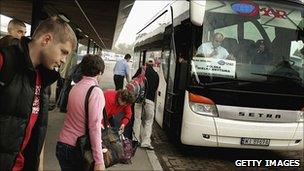EU chides UK over migrant workers from Eastern Europe
- Published

The biggest surge in EU immigrants to the UK came from Poland after 2004
The UK must end "discriminatory" rules for workers from the new EU member states in Central and Eastern Europe, says the European Commission.
As EU citizens, the Commission argues, workers from the eight former communist countries which joined the EU in 2004 have the same rights as UK nationals.
Currently migrant workers cannot claim welfare benefits if they have spent less than a year working in the UK.
EU governments agreed that such restrictions would only be temporary.
Most EU member states - apart from the UK, the Republic of Ireland and Sweden - kept work permit restrictions and quotas in place when the eight ex-communist countries joined.
But from 2006, most countries lifted the restrictions on workers from the Czech Republic, Hungary, Slovakia, Slovenia, Latvia, Lithuania, Estonia and Poland.
Similar when Bulgaria and Romania joined the EU in 2007, but many of these have now disappeared too.
The Commission said that seven years should be the absolute maximum for such restrictions to remain in force and that they must be "proportionate".
Human rights defence
EU treaties and directives enshrine the freedom to live and work in another EU member state - a key principle of the EU single market.
The UK opened up its labour market in 2004, but introduced a to prevent "benefit tourism". The one-year rule was intended to stop EU migrants coming to the UK for less than a year and claiming benefits.
Registering with the WRS costs ВЈ90 (104 euros; $144) and requires an employer's letter plus a valid passport or ID card. Workers from Cyprus and Malta, which also joined the EU in 2004, are exempt.
The UK experienced a big influx of workers from Poland and some other ex-communist countries, but since 2006 many have gone home as the job market has contracted.
WRS applicants totalled 118,675 in 2009 - 45% lower than the peak of 214,055 in 2006, show. Just over half the applicants in 2009 were from Poland.
The Commission says the EU's transitional arrangements for the new member states "allow the UK to restrict the right to reside as workers under certain conditions, but they do not allow discrimination when paying benefits".
Restricting benefits
Without the right to reside, EU workers - like those from outside the EU - do not qualify for UK Housing Benefit, Council Tax Benefit, Crisis Loans, social housing or homelessness assistance.
Under the WRS, workers who stop work before completing one year with an authorised employer do not have the right to reside.
Working for a year "without interruption" is defined as not having any breaks from work longer than 30 days.
So a worker made redundant after a few months or who spent more than a month off work sick would no longer qualify.
WRS restrictions do not apply to self-employed workers, students, migrant workers' families and migrants who have enough money to support themselves.
The Commission has warned the UK government that it has two months to bring its legislation into line with EU law, otherwise it may take the matter to the EU Court of Justice.
The UK Home Office says it is "considering the arguments presented by the European Commission".
"The UK takes its responsibilities under EU law very seriously and is fully committed to facilitating the exercise of free movement rights."
Legal dispute
An expert on EU law at Durham University, Eleanor Spaventa, says "it is not obvious that the WRS was ever compatible with EU law, even in 2004".
"The problem is that the UK provided a differential regime once workers had been allowed into the country - and that affected access to benefits," she told the ҙуПуҙ«ГҪ.
The transitional arrangements allowed countries to restrict access to jobs for certain nationalities temporarily, she said. "But if they were allowed to enter the labour market then equal treatment should apply - you could not discriminate on grounds of nationality."
The says all EU citizens have the right of residence in another member state for longer than three months "if they are workers or self-employed".
It also says an EU citizen who is no longer in work or self-employed "shall retain the status of worker or self-employed person" if he/she is temporarily off sick or is made redundant and has registered as a job-seeker.
The UK plans to keep the WRS in place until the end of April 2011.
That is also the deadline for Austria and Germany to lift their restrictions on workers from the former communist countries on their eastern borders.
- Published8 October 2010